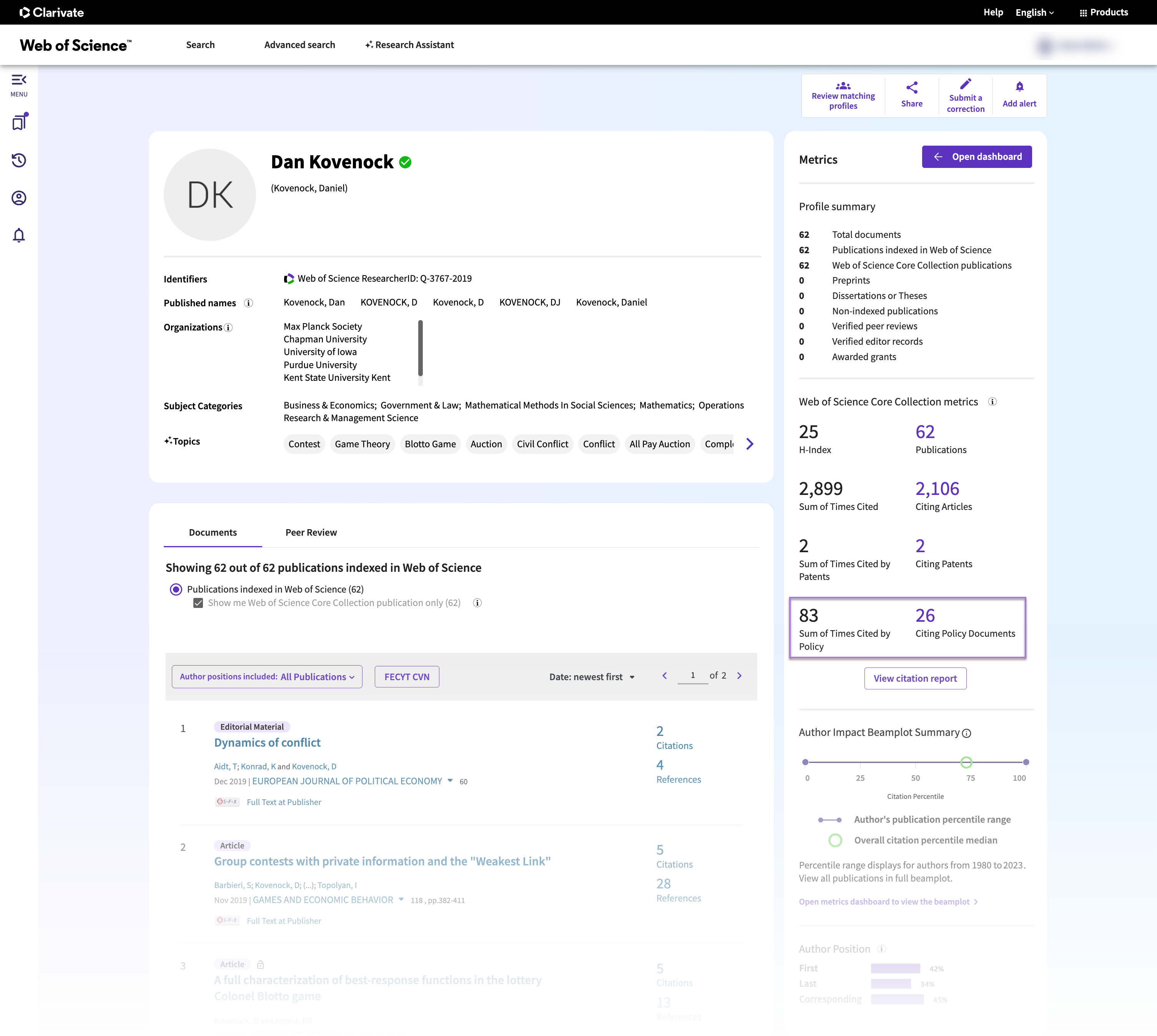Connecting research to real-world outcomes: policy documents in the Web of Science

The new Policy Citation Index on the Web of Science platform links policy documents to the research papers they cite, helping researchers and institutions demonstrate the societal impact of their work.
Although policymakers and analysts rely on academic research for decision-making, translating the recommendations from scholarly literature into practical solutions can be challenging. Researchers and policymakers operate in different environments, and the growing volume of published and grey literature can be overwhelming for both researchers and officials alike.
To help bridge the gap between research and policy, we are pleased to announce the release of the Web of Science Policy Citation Index, a new collection that adds reports, policy briefs and working papers from worldwide sources to the Web of Science platform.
Policy documents on the Web of Science platform
To conduct use-inspired research that aligns with policymakers’ needs, researchers need visibility into policy discussions. Upon release, the Policy Citation Index integrates documents from the ProQuest Policy File Index, which contains reports from hundreds of think tanks, research organizations and advocacy groups, including the Hoover Institution, International Monetary Fund, Organization for Economic Cooperation and Development, RAND Corporation and the World Bank. We are actively engaging more organizations, and our coverage will continue to grow. Throughout 2025, we will add more than a hundred new sources, with more to follow in the coming years.
We include documents that are prepared by policymakers and for policymakers, for example, to influence action on an issue. Policy documents in the database might detail implemented policy, provide an overview of an issue or outline a persuasive argument for implementing a policy in the future. Through citation linking, policy documents are connected to the literature that they cite, enabling Web of Science users to explore the research foundation for a proposed policy solution.
Solving real-world problems with research
By enhancing the discoverability of policy documents on the platform, the Web of Science helps researchers better align their research to real-world challenges. Researchers can now easily consult policy documents to focus their research efforts on topics that are directly relevant to societal issues and contribute to evidence-based policymaking. Policy documents also provide researchers with an additional source of data and statistics that may support their own studies.
Citation indexing deepens connections between policy documents and other scholarly outputs on the Web of Science. Citations from policy documents demonstrate that a piece of research has helped policy professionals develop, analyze and implement policy solutions that address societal problems. As more sources are added, the linkages will grow to provide a robust view of the societal impact of scientific and scholarly research.

Figure 1: Policy Citation Index record with linked cited references
Empowering the research community to demonstrate societal impact
Universities and researchers must articulate the value of their output to secure continued investment and sustain their initiatives. One of the most powerful ways to demonstrate research impact is by showing how it leads to real-world benefits for people and the planet. However, developing a narrative that clearly and directly links published research to tangible outcomes can be challenging. To aid in this, policy citations to papers on Web of Science Researcher Profiles now automatically appear, allowing researchers to easily share their broader impact with peers and evaluators.

Figure 2: Web of Science Researcher Profiles include citations from policy documents
As universities continue to develop their societal impact narratives, they need a consistent system that will guide them through a comprehensive assessment of their position. With this challenge in mind, the Institute for Scientific Information (ISI) recently developed a framework for evaluating the societal impact of research. The framework outlines a responsible and robust foundation for evaluation that includes a wide range of data sources, including those that extend beyond traditional scholarly output. Transferring knowledge to non-academic stakeholders is a component of university missions. Contributions to policy documents, via co-authorship or citation, provide evidence of that broader knowledge transfer.
The societal impact framework from ISI will power Web of Science Research Intelligence, an AI-native analytics platform currently in development with institutional partners. Data for multiple output types on the Web of Science platform, including policy documents and citations, will be available for analysis in Web of Science Research Intelligence.
Supporting the research community, now and into the future
To continue to meet the evolving needs of the research community, we are expanding the Web of Science platform and developing analytics capabilities powered by the next wave of AI technologies with Web of Science Research Intelligence. We are innovating to help researchers and institutions build impactful research strategies for the future.
Clarivate has focused on growing the Web of Science to include outputs that provide new angles and information on a research idea. Journal articles provide a snapshot of research findings; other outputs can augment a researcher’s understanding of a topic. The Web of Science presents early outputs, such as dissertations and theses, awarded grants, and preprints, alongside later-stage applications, such as patents, helping users easily consult developments along the entire research lifecycle. The Policy Citation Index represents another significant step forward in the ongoing expansion of the Web of Science platform to support researchers at every step of their research journey.
Learn more about the Policy Citation Index, or contact our team to suggest an additional policy source for indexing.



